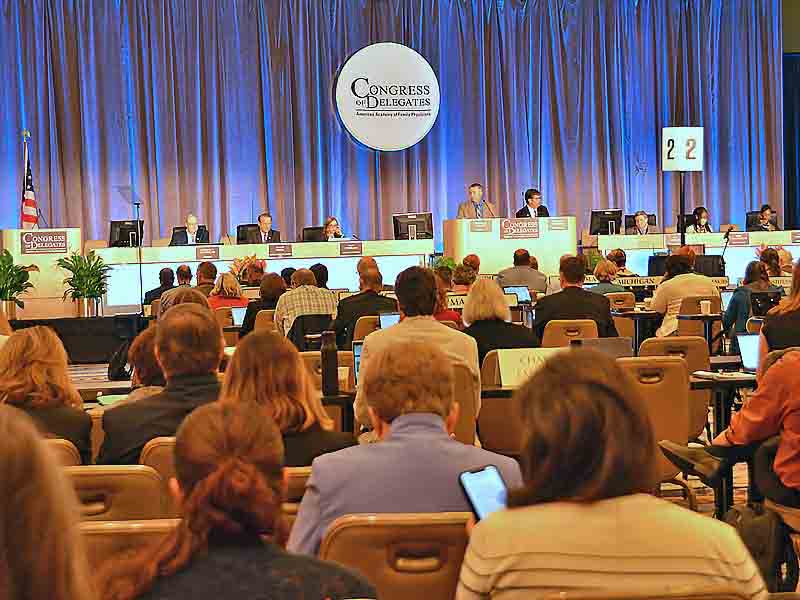AAFP Members Develop Policy at 2022 Congress of Delegates
October 7, 2022, 1:09 p.m. News Staff (Washington, D.C.) — “It’s been a long time.”
Those opening words from Ada Stewart, M.D., of Columbia, S.C., drew thunderous applause from the AAFP members gathered for an update about the organization’s work on members’ key priorities prior to the official start of the 2022 Congress of Delegates.

Stewart, who capped her tenure as Board chair at the meeting, responded with that same enthusiasm: “AAFP — we exist for you, our members,” she declared. “You are our power; you give us direction in what we need to do as an Academy.”
The Congress of Delegates, held Sept. 19-21, launched an exciting week of members coming together to celebrate family medicine that continued through the 2022 Family Medicine Experience, Sept. 20-23.
What Is the Congress of Delegates?
The COD is the Academy’s policy-making body and is part of the AAFP governance process through which members direct the work of the Academy.
During the annual convening of the COD, delegates elect the Academy’s new officers and directors.
Delegates and alternate delegates also discuss and vote on issues that chapters raise in resolutions they submit to the COD. Resolutions are a way for members, through their chapters, to ask the AAFP to act on specific issues on behalf of the specialty. Some of these requests reflect work the Academy already is doing. If a resolution calls for new action and delegates vote to adopt it, the AAFP invests resources to implement the effort.
The resolution process is one of several tactics that ensure members get the strong support they need to thrive in family medicine. The Academy also plans work based on commission inputs, direct member feedback, the deep experience of family physicians whom members elect to the Board and more.
Members Take Action
This year’s COD considered a larger slate of topics than usual. In addition to resolutions that were submitted for 2022, delegates also considered resolutions that were held over from the virtual 2021 COD for in-person discussion.
Delegates, alternate delegates and general registrants testified about topics in reference committee hearings, where panels of delegates and alternate delegates consider testimony from other members about resolutions on specific topic areas, such as advocacy and practice enhancement. Delegates considered the reference committees’ reports and recommendations and then voted whether or not to adopt a resolution or a reworked substitute, reaffirm it as current policy, or to refer it to the Board for further review and consideration.
For a complete readout, members can read the 2022 reference committee reports and details about topics held over from 2021. Below are highlights of a few resolutions that were adopted from each reference committee:
Practice Enhancement
- Prior Authorizations: With administrative burden topping members’ concerns in the annual AAFP Member Satisfaction Survey for years, two resolutions seeking to rein in the administrative problems and reverse delays in patient care associated with prior authorizations drew strong support. Delegates ultimately combined the two, adopting a measure that called for the AAFP to “advocate for the reduction of prior authorization requirements of health insurance companies through the creation of and adoption of standardized prior authorization criteria.”
- Stakeholder Metrics: Delegates adopted a measure that called for the Academy to work with stakeholders to develop metrics — similar to those CMS uses to evaluate physicians and practices — “that evaluate the collaboration, communication and service of health insurance companies with physicians,” nonphysician clinicians and patients, and to report their performance on those metrics annually.
Advocacy
- Restrictive Covenants: The COD voted to ask the Academy to “strengthen its existing policy against restrictive covenants to include noncompete activities that interfere with the physician-patient relationship and patient access to care” and undertake federal advocacy “to eliminate noncompete clauses and noncompete activities for family physicians.” Speakers focused on the ways noncompete clauses and restrictive covenants hurt physicians and patients by hindering access, worsening physician shortages and disrupting physicians’ well-being.
- HIPAA Updates: Delegates adopted a measure urging the Academy to advocate for HIPAA changes to allow commonly available real-time audiovisual communication technology, such as FaceTime, to be used for telehealth.
Health of the Public and Science
- Eat, Sleep, Console: Delegates adopted a resolution to update the neonatal drug withdrawal section of the AAFP’s substance use disorders policy to “include patient-centered methods of managing neonatal abstinence syndrome such as the Eat, Sleep, Console approach” and offer education on that approach.
- Postpartum care: Members gave testimony about the crucial role family physicians play in caring for parents and families, especially in the first year after birth. Ultimately, the COD reaffirmed the AAFP’s existing policy of advocating for strong support of postpartum care in the family medicine setting.
Cross-topical
- More POCUS CME: Delegates adopted a measure that called for the Academy to support more CME on point-of-care ultrasound at AAFP-sponsored events. Supporters expressed appreciation for the numerous POCUS-related offerings already available at AAFP events like FMX and the National Conference of Family Medicine Residents and Medical Students. More such opportunities, they said, could increase the POCUS training workforce.
Get Involved
The action taken by COD will affect family medicine for years to come. If you’d like to help shape this type of work, talk to your chapter about joining a commission or submitting a resolution for later consideration.